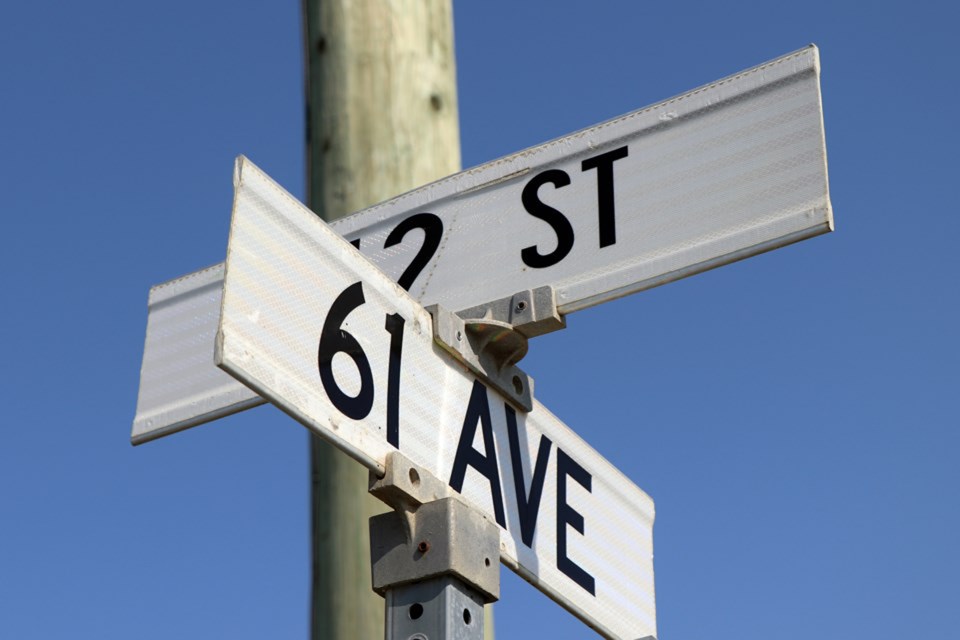INNISFAIL – Following last year’s controversy over a Special Tax Bylaw in the town’s southwest West Gate Industrial Park, town council approved two new ones for 2022 for 61st Avenue and 37th Street property owners.
However, it was not unanimous with administration’s first attempt on March 14, and final approval was not reached until March 28.
The two special tax bylaws for 61st Avenue and 37th Street property owners for the 2022 tax year were initially brought to council on March 14 for first, second and third readings.
While each recommended a motion that council “gives consideration to third reading”, votes were not unanimous and both were defeated. Each bylaw was unable to proceed to third and final reading.
Both bylaws, designed by the town to recoup a portion of recent million-dollar costs for road improvements, were brought back to council on March 28. Third readings were then passed by a vote of 6 – 1.
Mayor Jean Barclay was the lone council member who opposed both special tax bylaws.
“I believe it is important for us to build relationships with our business community and maintain a principle of fairness,” said Barclay. “There have been other road improvements in town. We’ve taken gravel roads and they’ve become hard surfaces. We haven’t applied this special tax to them, and 57th Street comes to mind and around the community gardens.”
The mayor added the revenues from the special tax is only 0.04 per cent of the overall budget.
“It’s really not significant and I’d rather see us build goodwill and work with the business community in the industrial park and maybe potentially they would support the town in our endeavors going forward on some of the projects we are looking at,” she said, adding she knew of one tax invoice last year from the industrial park that had 6.5 per cent tax increase. “That is significant.”
Barclay also reminded council there will be significant expansions that will be taking place in the future at the industrial park.
“That benefits the whole community, not just the corner of the community,” she said. “It is also about a philosophy I have - that we should all share in the investments made to better our community, and a road improvement project in my opinion is just one of those examples.”
However, Coun. Gavin Bates countered it was his belief there was “complete transparency” with the process, and the Special Tax Bylaw that was passed by the previous council in 2021 was “more than fair” to all the industrial area frontage users.
“It was collaborative at every stage. We met with them,” said Bates. “I do believe most of the properties were purchased with the full knowledge that they didn’t have paving and that was probably entered into the pricing of their purchases and I don’t believe the general tax base should have to foot the bill. It is just a fraction.”
With the approval of the special tax for 37th Street property owners, the town will generate total tax revenue in the amount of $75,068.25, or $5,004.55 of revenue per year for the next 15 years starting in 2022.
From 61st Avenue property owners, the Special Tax Bylaw will generate total tax revenues in the amount of $88,134.75 or $5,875.64 of revenue per year for the next 15 years that began in 2021.
The Special Tax Bylaw process, which began last year, encountered a major hitch in 2021 when 61st Avenue property owners complained through local lawyer Chad Evans they were not consulted properly during the process.
Evans also outlined several problematic issues he felt did not comply with the provincial Municipal Government Act (MGA). He said clients’ concerns centred around the timing of the special tax, lack of consultation, and whether the levy was properly put into effect.
Town CAO Todd Becker later apologized, conceding there were “technical challenges” with some sections of the bylaw that did not meet the standards set by the MGA.
The Special Tax Bylaw issues were later addressed and fixed by administration. The special tax bylaws must be brought back to council every year for approval.



